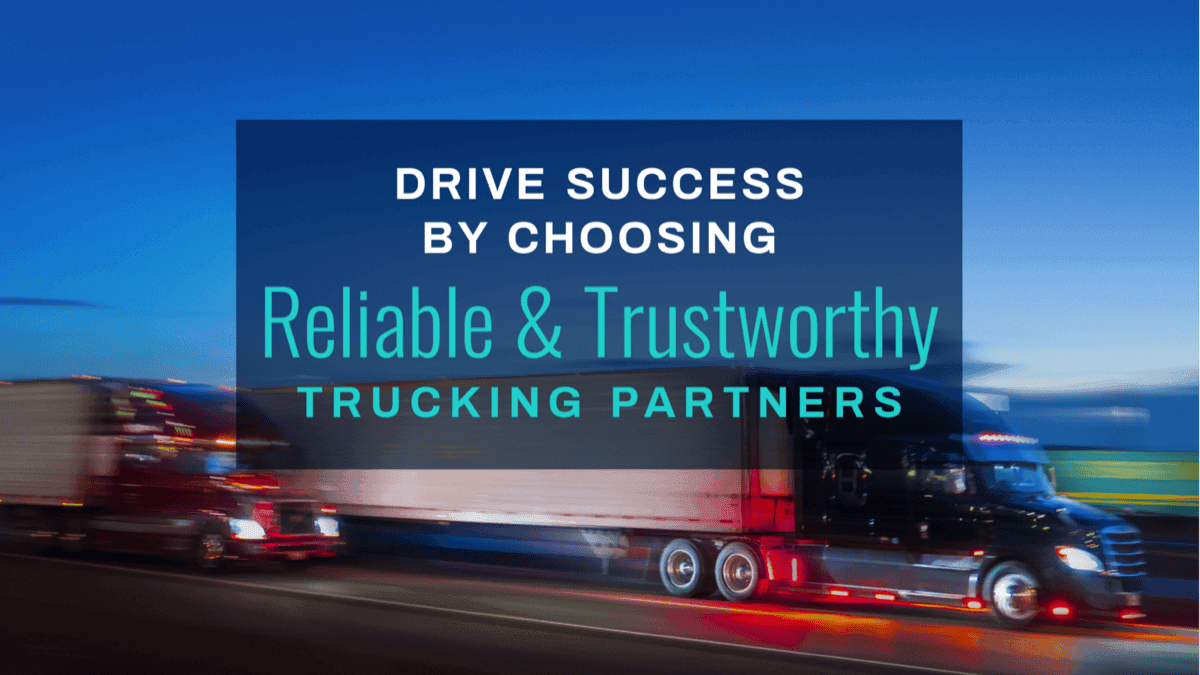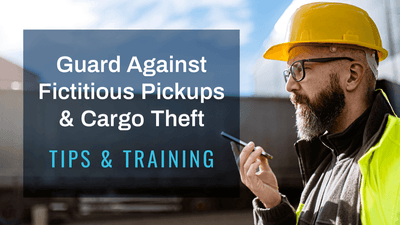June 02, 2025 | Cargo Insurance
How to Select a Reliable Trucking Partner: A Guide for 3PLs to Combat Industry Fraud

By Trent Van Wormer, Strategic Relationship Manager
The transportation industry operates on trust, efficiency, and strong partnerships. For third-party logistics providers (3PLs), choosing a reliable trucking partner is not only critical for operational success but also essential in combating fraud—a persistent threat in the logistics industry. According to the Transportation Intermediaries Association (TIA), fraud-related issues, including double brokering and carrier identity theft, cost the industry millions annually. By conducting thorough due diligence, 3PLs can mitigate risks and build long-term, trustworthy relationships with great trucking partners. Here are the key factors to consider.
Operational Capabilities and Capacity
Assessing a trucking company’s operational capabilities is the first step in determining suitability. This involves examining their fleet size, vehicle types, and capacity to handle diverse cargo needs. Look for carriers equipped to manage fluctuating shipment volumes and specialized cargo, such as refrigerated goods or oversized items.
Fraud Prevention Tip: Confirm fleet ownership by cross-referencing vehicle registrations and ownership details through the Federal Motor Carrier Safety Administration (FMCSA) or equivalent databases. Avoid partnerships with companies that are unable to provide verifiable fleet information.
Service Reliability and Performance Metrics
A trucking company’s track record is a strong indicator of its reliability. Evaluate their on-time delivery performance, claims ratio, and overall service quality. Tools like MyCarrierPortal or LoadProof can provide insights into a carrier’s historical performance. Red flags, such as reports of double brokering or frequent incidents, should prompt further investigation.
Fraud Prevention Tip: Use FMCSA’s Safety and Fitness Electronic Records (SAFER) system to review carrier incident reports and verify that their operating authority is active and in good standing.
Safety and Compliance
Safety should always be a top priority. Verify that the trucking company complies with federal and state regulations, including the FMCSA’s Compliance, Safety, and Accountability (CSA) program. Confirm that they maintain rigorous maintenance schedules, employ qualified drivers, and uphold robust safety protocols.
Fraud Prevention Tip: Check the company’s CSA score and ensure they have valid operating authority. Review driver qualification files for evidence of proper licensing and certifications.
Technology and Integration Capabilities
Advanced technology enhances transparency and operational efficiency. A reliable trucking partner should utilize transportation management systems (TMS), electronic data interchange (EDI), and real-time tracking solutions to provide seamless communication and shipment visibility.
Fraud Prevention Tip: Real-time tracking solutions with VIN verification can help confirm the authenticity of the carrier’s fleet and prevent fraudulent activities.
Financial Stability and Insurance Coverage
A financially stable trucking partner is less likely to engage in unethical practices to stay afloat. Assess the company’s financial health by reviewing credit reports, payment histories, and financial statements. Additionally, ensure they maintain robust insurance coverage, including liability, cargo, and workers’ compensation insurance. Adequate insurance coverage is critical to protect your business from potential risks and losses. Failing to select a trucking company with sufficient insurance for the load could compromise coverage, leaving you exposed to financial liability and negatively affecting loss ratios in the event of a claim. Choosing a partner with strong financial stability demonstrates their commitment to meeting industry standards and operating responsibly.
Fraud Prevention Tip: To avoid counterfeit documentation, request certificates of insurance directly from the carrier’s insurer. Cross-check policy details, including coverage limits and expiration dates.
Reputation and Industry Affiliations
A trucking company’s reputation speaks volumes about its reliability and ethics. Research their standing among peers, customers, and partners. Affiliations with reputable organizations such as TIA or the National Shippers Strategic Transportation Council (NASSTRAC) indicate a commitment to professional standards.
Fraud Prevention Tip: Regularly verify the company’s contact information, including phone numbers and addresses, against FMCSA records to ensure consistency and prevent falling victim to identity theft schemes.
Customization and Flexibility
Market dynamics often require flexibility from trucking partners. Assess their ability to tailor services to your specific needs, adapt to seasonal fluctuations, or handle unexpected disruptions. A partner willing to collaborate and customize their services will likely provide greater long-term value.
Fraud Prevention Tip: Clarify service expectations in contracts and monitor for discrepancies in their execution to detect any potential misrepresentation.
Cost Structure and Pricing Transparency
Competitive pricing is important, but transparency is non-negotiable. Evaluate the trucking company’s cost structure, fuel surcharges, and any additional fees. A transparent pricing model demonstrates trustworthiness and reduces the risk of hidden costs.
Fraud Prevention Tip: Beware of rates significantly below market averages, as they may signal fraudulent behavior or unsustainable practices.
The logistics industry’s reliance on strong partnerships makes it a prime target for fraud, but 3PLs can safeguard their operations by implementing a comprehensive vetting process. Assessing a trucking partner’s operational capabilities, reliability, safety standards, technology, financial health, reputation, flexibility, and pricing transparency ensures a solid foundation for collaboration. Tools like FMCSA’s databases, MyCarrierPortal, and LoadProof are invaluable in verifying credentials and tracking performance.
In an industry where reputation and reliability are paramount, investing time in due diligence can save 3PLs from the costly repercussions of fraud. By prioritizing trust and transparency, logistics providers can create partnerships that not only drive operational success but also uphold the integrity of the 3PL sector.
References
- Federal Motor Carrier Safety Administration (FMCSA): www.fmcsa.dot.gov
- Transportation Intermediaries Association (TIA): www.tianet.org
- LoadProof: www.loadproof.com
- MyCarrierPortal: www.mycarrierportal.com
Previously published on the TIA Fraud Resources Page Jan. 2025
Disclaimer: This information is provided as a public service and for discussion of the subject in general. It is not to be construed as legal advice. Readers are urged to seek professional guidance from appropriate parties on all matters mentioned herein.













